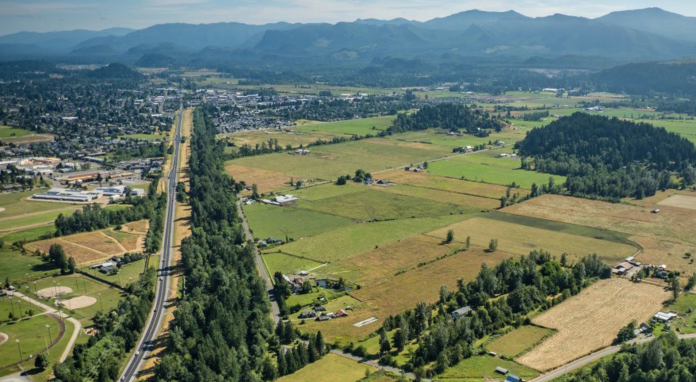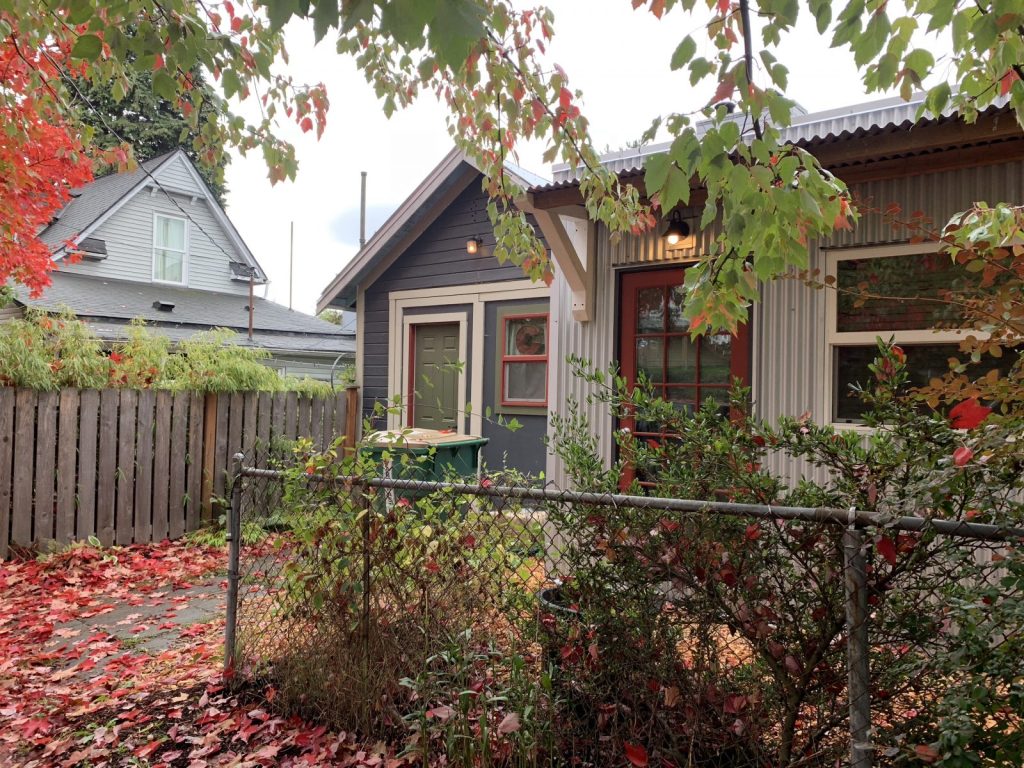
Whether allowing new detached dwelling units on most lots in the state’s rural areas would undermine decades of growth planning is a question that’s been put front-and-center by House Bill 2126.
Whether to allow property owners in Washington’s rural areas to build detached accessory dwelling units (DADUs) separate from a main house is turning into a fairly contentious issue during this year’s legislative session. To many policymakers grappling with Washington’s housing affordability crisis, the change is a sensible one that would allow flexibility and lead to increased housing options in the state’s rural areas but on the other side are conservation and environmental advocates concerned that potentially doubling the number of units allowed on rural lots will lead to increased sprawl and out-of-control water usage.
Unlike attached ADUs, which are built as an addition to a main dwelling structure, with a separate entrance but with shared utilities, DADUs are wholly separate structures. Last year, the legislature passed a sweeping overhaul of ADU policy, allowing both ADUs and DADUs on most lots in the state’s urban areas, but the question of what should be allowed near farmlands in rural areas is another question with broad implications on Washington’s overall housing growth strategy.
House Bill 2126, introduced by Representative Sam Low (R-39, Lake Stevens), who also serves as a Snohomish County Councilmember, would allow property owners in rural areas to construct a detached accessory dwelling unit on any sized lot, as long as no critical areas are encroached upon and the permit applicant can demonstrate that the existing sewage or septic system can handle the increased demand, and the new DADU must use the same driveway as the primary dwelling.
The bill is a direct response to a ruling from the state’s Growth Management Hearings Board (GMHB), the entity tasked with resolving disputes over the 1990 Growth Management Act (GMA). In 2022, Snohomish County passed an ordinance significantly expanding the number of lots where property owners could build DADUs outside the urban growth boundary. An appeal was filed, and in 2023 the GMHB ruled against Snohomish County, finding that the ordinance “fail[ed] to protect designated agricultural lands of long-term commercial significance,” and that it was inconsistent with its own countywide planning policies. The county was forced to reverse its ordinance, putting back in place restrictions on DADUs on lots that don’t meet the standard lot size, but HB 2126 would allow Snohomish County to reinstate that policy, and any other county that so chooses. It would not automatically take effect.
“This strong, bipartisan, reasonable bill is a very complex attempt at threading the eye of the needle when it comes to detached ADUs,” Rep. Low said at the first public hearing on his bill in mid January. “Most of this bill is not original with me…It picks up on previous discussions and previous negotiations and truly attempts to find common ground in the middle to get a strong bipartisan, affordable rural housing DADU [bill] across the finish line.”
So far, the bill hasn’t gotten much pushback from within the legislature itself, with its first vote out of the House’s housing committee completely unanimous. In the coming days, the bill is expected to be pulled to the floor for a full vote of the House.

But advocates for land conservation in many corners of the state came out to oppose the bill. “Generally speaking, the approval of ADUs in rural areas will only serve to further legitimize illegal urban sprawl into rural areas, which is in violation of the very essence of the GMA,” said Phyllis Kardos, the co-chair of Responsible Growth Northeast Washington, which is focused on Pend Oreille County. “This is a case where what may look good on paper has a detrimental environmental cumulative impact on the ground. Whether it is a large piece of rural land or a small rural lot, fragmentation of these areas to accommodate more houses and people will result in additional forest land, agricultural land, open space destruction and loss.” The legislature also heard from advocates in places like the San Juan islands and Whidbey island, where rural land is even more scarce.
One of the more worrying aspects of the bill, sprawl opponents say, is a provision that would not count the DADUs that would be permitted under the bill as contributing to the area’s official growth targets, essentially allowing additional units built as DADUs to come in on top of other units being built in rural areas. King County currently does allow DADUs like the ones that would be permitted under HB 2126, but includes them in its rural growth targets. HB 2126 would essentially double the number of units allowed in rural areas of King County under the GMA, even as the county is trying to focus growth in urban areas.
Futurewise, the statewide nonprofit that often finds itself the sole steward of the Growth Management Act when it comes to legal appeals, was the organization that took Snohomish County to the Growth Management Hearings Board over its DADU bill. They’re urging lawmakers to reject the bill, and spend more time working on a policy that makes more sense for rural areas.
“Obviously Futurewise has been supporting urban accessory dwelling units of all types for quite a while now,” Alex Brennan, Futurewise’s executive director, told The Urbanist. “But when we get into the rural context, the actual reality of what’s getting built looks really different.” He cited increased costs to provide emergency services in rural areas, increases in the amount of impervious surfaces that come with DADUs, and, at the top of the list, increased water usage as primary reasons that Futurewise doesn’t want to see the bill move forward.
“Studies that have been done looking at rural attached accessory dwelling units compared to rural detached accessory dwelling units, [showing] that the detached units use a lot more water and that can be kind of counterintuitive, but that’s really about outdoor water use,” Brennan said. “And you end up just seeing a lot more water use and that’s particularly concerning, also, because we don’t have good ways of regulating water use just in general for small residential development in rural areas.”
A distinct but similar counterpart bill in the state senate, SB 6029, is also on the receiving end of criticism from conservation and smart growth advocates, but would ultimately be less permissive than HB 2126, only allowing DADUs on conforming lots.
Representative Julia Reed, who represents the 36th legislative district which includes some of the most urban areas of the state including Queen Anne and Ballard but no rural areas, signed on as a co-sponsor of HB 2126. “I’m not 100% sold one way or the other, but I signed on, because, I think this is a conversation actually, really worth having. And I think we’re gonna have to talk a lot more about, what does rural housing look like today? Because it’s very different from what it looked like, even 20 years ago.”
“I was very moved by testimony in committee that we heard on this bill, specifically around the idea that regardless of what’s happening with state regulations, these ADUs are going in, people are building them as sheds or as something else,” Reed told The Urbanist. She also brought up property owners who aren’t able to build a detached ADU so they purchase adjoining or nearby properties instead. “So while you know the Growth Management Act is supposed to protect and preserve the farmland that we have, because people feel that it’s no longer responding to the reality of what’s going on in their communities, we’re losing more farmland by being very hardline on this piece around the Growth Management Act.”
Brennan described the idea that restrictions on new units should be loosened because people aren’t currently complying with them as frustrating. “From our perspective, if the problem is enforcement, then we should come up with an enforcement strategy,” he said. “The Growth Management Act is being blamed for causing problems in rural parts of the state that are really not about the Growth Management Act, from our perspective…I think we want to have a real dialogue with folks who are coming from those communities concerned about those issues and seeing this as a potential solution.”
Ryan Packer has been writing for The Urbanist since 2015, and currently reports full-time as Contributing Editor. Their beats are transportation, land use, public space, traffic safety, and obscure community meetings. Packer has also reported for other regional outlets including BikePortland, Seattle Met, and PubliCola. They live in the Capitol Hill neighborhood of Seattle.

